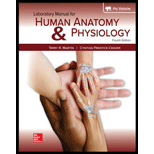
Concept explainers
Which of the following membrane movements is not a passive process?
- osmosis
- diffusion
- active transport
- filtration
Introduction:
Passive transportation is a method in which the movement of the cellular substances takes place from one cell to another. Energy is not required in the transport of molecules.
Answer to Problem 1PL
Correct answer:
The correct answer is option (c) active transport.
Explanation of Solution
Explanation/justification for the correct answer:
Option (c) active transport. Active transportation is the passage of molecules from cell to cell. It requires energy for the process of transport as the movement is initiated against the concentration gradient. So, the correct answer is option (c).
Explanation for incorrect answer:
Option (a) osmosis. Osmosis is a process of movement of water molecules from low concentration to a high concentration. It requires no energy for the process of transport. So, this is an incorrect option.
Option (b) diffusion. Diffusion is a process of movement of molecules, ions, and atoms from high concentration to low concentration. It occurs in the absence of energy. So, this is an incorrect option.
Option (d) filtration. Filtration is a process of movement of solute or fluid against the gradient. The process of filtration occurs by applying the pressure, which can result in the movement of the molecules against the gradient. It does not require energy and filter across the semi-permeable membrane. So, this is an incorrect option.
Want to see more full solutions like this?
Chapter 6 Solutions
Laboratory Manual For Human Anatomy & Physiology
- The passive movement of a solute through a membrane protein down its concentration gradient is an example of _________. a. osmosis b. active transport c. endocytosis d. diffusionarrow_forwardA transport protein requires ATP to pump sodium ions across a membrane. This is a case of ______. a. passive transport b. active transport c. facilitated diffusion d. a and carrow_forwardThe plasma membrane __________. a. surrounds the cytoplasm b. separates the nucleus from the cytoplasm c. separates the cell interior from the environment d. both a and carrow_forward
- Which of the following methods of transport is being used to transfer the substance into the cell in the accompanying graph? a. diffusion down a concentration gradient b. osmosis c. facilitated diffusion d. active transport e. vesicular transport f. It is impossible to tell with the information provided.arrow_forwardDistinguish between the following pairs of terms: a. diffusion; osmosis b. passive transport; active transport c. endocytosis; exocytosisarrow_forwardThe principal force driving movement in diffusion is______. a. temperature b. particle size c. concentration gradient d. membrane surface areaarrow_forward
- If a cell is placed in a solution that has the same concentration of solutes as in its cytoplasm, the solution is referred to as: O Isotonic Hypertonic O Hypotonic Osmoticarrow_forwardWhich of the following is true regarding the permeability of the cytoplasmic membrane? Nothing can diffuse across the membrane All molecules can freely diffuse across it Only non-polar molecules can diffuse across the membrane It is generally impermeable to ions, polar moleculesarrow_forwardIn reference to diffusion, the solutes will move through the membrane towards The side with greater amount of water The side with least amount of water The side with greater amount of solutes The side with least amount of solutesarrow_forward
- Which of the following statements about passive processes of membrane transport is false? cellular energy is not required substances move along its concentration gradient all require the aid of proteins during transport a and b a and carrow_forwardWhich of the passive transport processes requires hydrostatic pressure to transport molecules across membranes in the body? Multiple Choice Osmosis Filtration Facilitated diffusion Pinocytosis Diffusionarrow_forwardThis type of cell transport requires energy (ATP) and moves substances from low to high concentration. Active Passive Osmosis Diffusionarrow_forward
 Biology Today and Tomorrow without Physiology (Mi...BiologyISBN:9781305117396Author:Cecie Starr, Christine Evers, Lisa StarrPublisher:Cengage Learning
Biology Today and Tomorrow without Physiology (Mi...BiologyISBN:9781305117396Author:Cecie Starr, Christine Evers, Lisa StarrPublisher:Cengage Learning Human Biology (MindTap Course List)BiologyISBN:9781305112100Author:Cecie Starr, Beverly McMillanPublisher:Cengage Learning
Human Biology (MindTap Course List)BiologyISBN:9781305112100Author:Cecie Starr, Beverly McMillanPublisher:Cengage Learning Human Physiology: From Cells to Systems (MindTap ...BiologyISBN:9781285866932Author:Lauralee SherwoodPublisher:Cengage Learning
Human Physiology: From Cells to Systems (MindTap ...BiologyISBN:9781285866932Author:Lauralee SherwoodPublisher:Cengage Learning Concepts of BiologyBiologyISBN:9781938168116Author:Samantha Fowler, Rebecca Roush, James WisePublisher:OpenStax College
Concepts of BiologyBiologyISBN:9781938168116Author:Samantha Fowler, Rebecca Roush, James WisePublisher:OpenStax College



